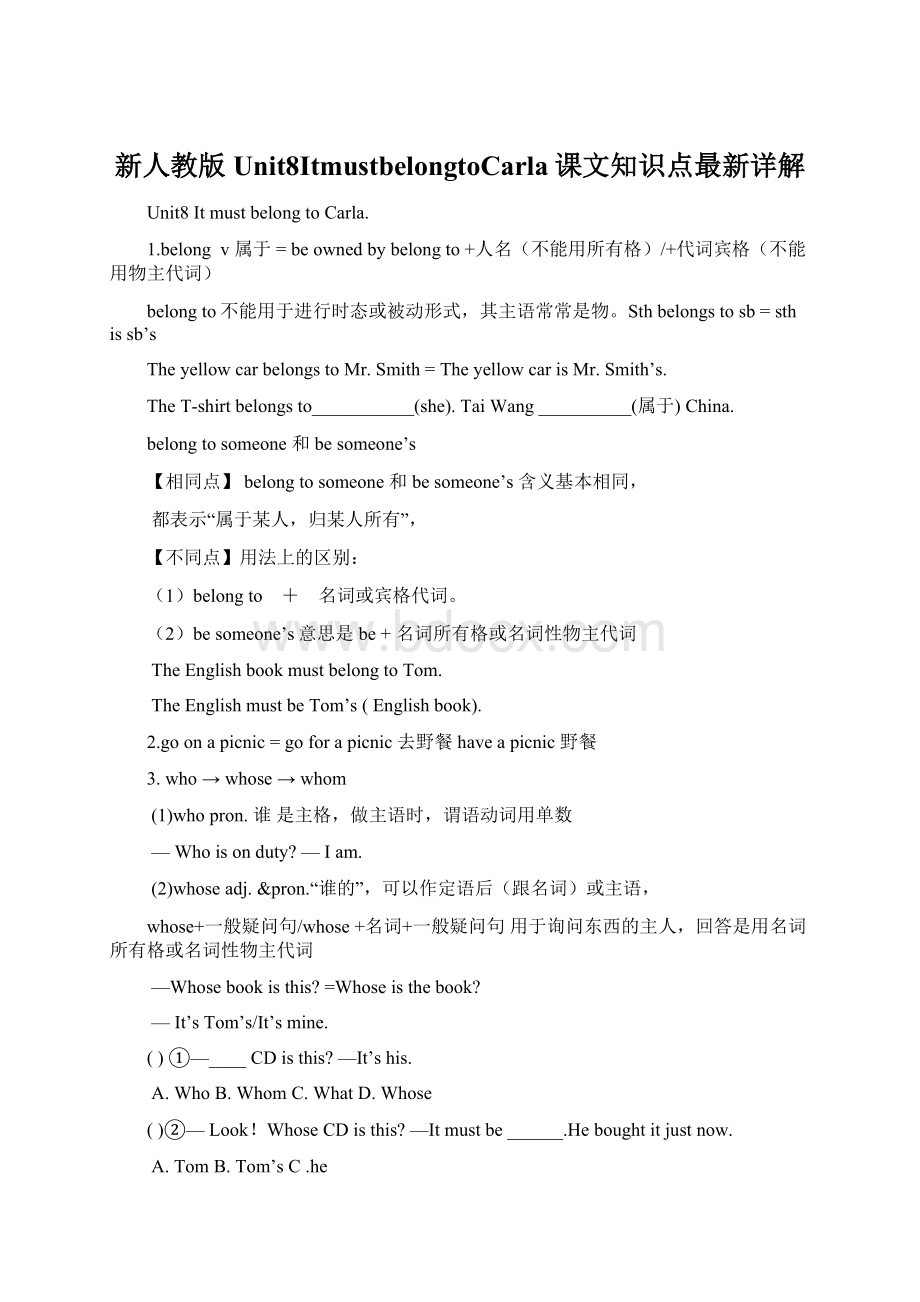新人教版Unit8ItmustbelongtoCarla课文知识点最新详解.docx
《新人教版Unit8ItmustbelongtoCarla课文知识点最新详解.docx》由会员分享,可在线阅读,更多相关《新人教版Unit8ItmustbelongtoCarla课文知识点最新详解.docx(15页珍藏版)》请在冰豆网上搜索。

新人教版Unit8ItmustbelongtoCarla课文知识点最新详解
Unit8ItmustbelongtoCarla.
1.belongv属于=beownedbybelongto+人名(不能用所有格)/+代词宾格(不能用物主代词)
belongto不能用于进行时态或被动形式,其主语常常是物。
Sthbelongstosb=sthissb’s
TheyellowcarbelongstoMr.Smith=TheyellowcarisMr.Smith’s.
TheT-shirtbelongsto___________(she).TaiWang__________(属于)China.
belongtosomeone和besomeone’s
【相同点】belongtosomeone和besomeone’s含义基本相同,
都表示“属于某人,归某人所有”,
【不同点】用法上的区别:
(1)belongto + 名词或宾格代词。
(2)besomeone’s意思是be+名词所有格或名词性物主代词
TheEnglishbookmustbelongtoTom.
TheEnglishmustbeTom’s(Englishbook).
2.goonapicnic=goforapicnic去野餐haveapicnic野餐
3.who→whose→whom
(1)whopron.谁是主格,做主语时,谓语动词用单数
—Whoisonduty?
—Iam.
(2)whoseadj.&pron.“谁的”,可以作定语后(跟名词)或主语,
whose+一般疑问句/whose+名词+一般疑问句用于询问东西的主人,回答是用名词所有格或名词性物主代词
—Whosebookisthis?
=Whoseisthebook?
—It’sTom’s/It’smine.
()①—____CDisthis?
—It’shis.
A.WhoB.WhomC.WhatD.Whose
()②—Look!
WhoseCDisthis?
—Itmustbe______.Heboughtitjustnow.
A.TomB.Tom’sC.he
“____bookcaseisthis?
”“Itmustbe_____.”
A.Who’s;TomB.Who’s;Tom’C.Whose;Tom’sD.Whose;Tom
(3)whompron.谁的,是宾格,在句中做介词、动词的宾语
()______wasthetelephoneinventedby?
A.WhoB.WhomC.WhatD.Whose
4.must表示肯定推测,“一定,肯定”,
must
(1)一般用于肯定句,表示对现在的情况进行推测、推断、猜测或判断,一般把握性较大。
(2)含有must推测的句子变为反意疑问句,要根据must后面的动词来确定
Theremustbesomethingwrongwiththebike,_____________?
(3)含有must推测的句子变为否定句时,用can’t“不可能”
Therecan’tbesomethingwrongwiththebike.
mustn’t,表示“不准,禁止,不可以”
Youmustn’tlendthebooktoothers.
Schoolstudents_____smokebecauseitisagainsttheschoolrules.
A.needn’tB.couldn’tC.won’tD.mustn’t
writer=authorn作家
5.attendv出席;参加attendameeting出席会议
【辨析】join/takepartin/attend
(1)join指加入某个党派,团体组织等,成为其中一员,意为“参军,入党,入团”。
jointheArmy/theParty/theLeague
joinsb.in(doing)sth.和某人一道做某事
Willyoujoinusinthepicnic?
joinin多指参加小规模的活动如“游戏,比赛”,口语中常用。
Joininthebasketballgame.
(2)takepartin指参加群众性活动,着重说明主语参加该项活动并在活动中发挥作用。
We’lltakepartinthesportsmeeting/club.
takeanactivepartin积极参加……
(3)attend正式用语attendedaconcert______________
vt.指参加会议,婚礼,葬礼,典礼;去上课,上学,听报告等。
句子主语只是去听,去看,自己不一定起积极作用。
DidyouattendthemeetinglastSunday?
Somemodelteacherswereinvited__________(attend)themeeting.
6.valuen价值→valuableadj.贵重的;很有用的;宝贵的
Ithinknothingelseintheworldismore___________(有价值的)thanmyparents’love.
7.can’t“不可能”,是否定推测,语气较有把握。
()—Whoseshoesarethese?
—They____beMike’s.Theyaremuchtoolargeforhim.
A.mightB.mayC.mustn’tD.can’t
8.rememberv 记住(反) forget
(1)rememberdoingsth记得做过某事(已做了)
(2)remembertodosth记住要做某事(还没做)
①Don’tyouremember_____________(see)somewhereinEnglandlastweek?
②Pleaseremember_______________(close)thewindowwhenyouleave.
9.restv休息n剩余部分
“therestof+名词”时,谓语动词的数要与therestof所表示的名词的数保持一致
()Therestofthestudents____intheclassroom.
A.isstudyingB.arestudyingC.bestudyingD.isstudied
10.pickup接电话Tom,Icalledyou,butyoudidn’tpickup
捡起;拾起Ipickupawalletonmywayhome(开车)接某人Iwillpickyouupatthestation
学到;获得Hewaspickinguptheskillsquickly.
Itseemsthattheagedpeople____theH7N9moreeasilyfromtherecentcase.
A.pickupB.mixupC.setupD.useup
11.anybodypron.任何人
(1)anybody是不定代词,表示“任何人,无论什么人”。
anybody与somebody相对应,
但是anybody常用在否定句、一般疑问句或条件句中,用在肯定句中表示“任何人”。
(2)anybody作主语时,谓语动词用单数形式。
【拓展】由body组成的不定代词somebody,anybody,nobody,everybody
不定动词的用法:
(1)构成:
some,any,every,no都能和one,body,thing一起构成复合不定代词
(2)复合不定动词作主语,谓语动词用单数
Everybodyishere.
(3)修饰不定动词的定语要后置
somethinginteresting有趣的东西somethingtoeat吃的东西
(4)在表示请求、建议、反问等语气的疑问句中,问话者希望得到肯定回答时要用something,somebody,someone
—Wouldyoulikesomethingtodrink?
—Yes,please.
(5)在反意疑问句中,somebody,anybody等作主语时,附加问句用he或they;something,everything等作主语时,附加问句用it.
Nobodyisintheclassroom,ishe/arethey?
Everythingisready,isn’tit?
()Wecan’tfind____inthehouse.
A.somethingstrangeB.anythingstrangeC.strangesomethingD.strangeanything
12.noisen噪音→noisyadj.吵闹的→noisilyadv吵闹地
makeanoise制造噪音
Thechildrenoftenget_________(noise)intheclassroomafterclass.
【拓展】noise,voice与sound辨析:
(1)noise意为“噪声”,指不悦耳的噪音等,可以用a,some,much等词修饰。
(2)voice意为“声音”,多指人的说话声、歌声和笑声等。
(3)sound可以指听到的自然界的一切声音。
( )—Didyouhearanystrange________whenthequakehappened?
—No,Iwasinmygardenwithmyflowersandwasenjoying
thebeautiful________ofmybirdsatthattime.
A.voice;noise B.noise;soundC.whisper;soundD.sound;voice
13.policemenn男警察(pl)policemen
Policewoman女警察(pl)policewomen
policen警察(集体名词,做主语时,谓语动词用复数形式)
Thepolicearelookingforthelostchild.
Some_____________(policeman)weresearchingthehouseforusefulclues(线索).
14.else.else与other的区别:
二者均有“别的;其他的”意思,
⑴else修饰疑问词或不定代词,放所修饰词之后;
【注】当else修饰不定代词时,所有格应该放在else上,而不应该放在代上,somebodyelse.Anybodyelse等的所有格形式是somebodyelse’s;anybodyelse’s等
orelse否则,要不然
Idon’twanttogetanybodyelse’smoneyandhelp.
⑵other修饰名词,且放名词前。
either【辨析】too/also/either的用法
e.g.Sheisasinger,too.HecanalsosingtheEnglishsong.
Ifyoudon'tgotothepark,hewon'tgothere,either.
15.seesb.doingsth.看见某人正在做某事(强调动作正在发生)
seesb.dosth.看见某人做某事(强调发生的整个过程)
Iseemomcookinginthekitchen.Lucysaidshesawmedothehousework.
runaway=escapefrom
【短语】runoff(从容器中溢出;流出)runout(of)____________runafter__________
sureadj.一定的,可靠的
(1)besuretodosth一定要,务必,一定会(表推测判断)
Besure________(write)tomeassoonasyouarrivethere.
(2)besureof/aboutdoingsth确信,对……有把I’msureofsuccess.
(3)besure+that从句确信,认为……一定会I’msurethathe’llpasstheexam.
(4)makesure弄清,查明
()①____tocomeandmeetmyfamilytonight,willyou?
A.BesureB.TobesureC.BeingD.Makesure
()②Besure_______andwatchTV.
A.sayathomeB.stayedathome
C.stayingathomeD.tostayathome
16.wolfn.狼
【拓展】以f(e)结尾的名词,其复数形式改f(e)为______再加______。
wife(妻子),knife(小刀),wolf(狼),thief(小偷),shelf(架子),
self(自己),life(生命),half(一半),leaf(树叶)。
________(wolf)areusuallyfriendlyandhelpfultoeachotherwhentheyliveingroups.
17.feel用作实义动词的用法
表示“感觉”,属感官动词,其后接不定式的复合结构作宾语时,不定式不能带to
Weallfeltthehouseshake.
feel用作连系动词的用法
1. 表示某人的感觉,以人作主语。
Idon’tfeelverywelltoday.
2. 表示某物摸起来给人的感觉,通常要以被摸之物作主语。
Silkfeelssoftandsmooth.
()Cotton______niceandsoft.
A.feellike B.feelslike C.feel D.feels
【拓展】feellike的用法表示“感到想要(做某事)”,其后接名词或动名词。
feellikedoingsth=wouldliketodosth=wanttodosth想要去做某事
Doyoufeellike___________(have)adrink?
18.Therebesb./sth.doingsth.某人某物正在……
therebe句型和情态动词连用时,表示对现有情况的猜测,
其结构形式:
there+情态动词+be+名词。
( )Thereisaboy________basketballontheplayground.
A.play B.playsC.toplayD.playing
19.hope的用法:
(1)hope__________sth.Mylittlebrotherhopesto________(be)agoodsinger.
(2)hope+______从句
( )Myparentshope________ateacher.
A.metobe B.IwillbeC.ItobeD.tobe
goaway走开,离去
havefun________sth.表示“做某事有乐趣”。
=haveagoodtimedoingsth.=enjoydoingsth.
Ihavefunflyingkites.Theyhadfunplayingbasketballyesterday.
( )Wehadfun________intheriverlastSunday.
A.swim B.SwimmingC.swamD.swum
toomany,toomuch与muchtoo
—Wouldyouliketoplaybasketballwithme?
—I'dloveto,butIhave________homeworktodo.
A.toomuch B.toomanyC.muchtooD.manytoo
21wonderv/n希望知道;惊奇;奇迹(=wanttoknow)→wonderfuladj.奇妙的→Wonderfullyadv.非常好地ChineseWomen’sVolleyballteamplayed____________(wonder)inthematch
Nowonder+句子“难怪.....”Nowonderyouareangry.难怪你觉得生气。
—Howdoyoulikethetalkshow?
—Ithinkit’s________,butsomepeoplethinkit’sso________.
A.wonderfulenough;boredB.enoughwonderful;boringC.wonderfulenough;boring
22.hearsb/sthdoingsth听见某人/某物正在做某事
listento/hear辨析:
()He_____butcould_____nothing.
A.heard;listenedB.listened;heardC.heard;heard
hearsb.dosth听见某人做某事Ioftenhearhimsingintheroom.
hearsb.doingsth听见某人正在做某事Ihearhimsingingintheroom
()Whenthelittleboy_____someonecomingupstairs,hestopped_____.
A.heard;tocryB.listened;cryingC.heard;cryingD.listened;tocry
hearof/about听说hearfrom=receivealetterfromsb.收到某人的来信
I’msorrytohearthat.听到这件事我很难过(指听到别人不幸的消息时的用语)
()①Howoftendoyou_____yoursister?
A.hearB.hearofC.hearfromD.hearabout
()②—Mikehurthisarmthedaybeforeyesterday.Nowhe’sinhospital.
—_____.
A.I’msorrytohearthatB.That’sallright.C.Ihopeyou’llfeelbettersoon
waterrunning流水
23.takeashower洗澡
24.alot很多,做副词短语,修饰动词,放在动词之后。
()Heknows____aboutthisevent.
A.alotofB.lotsofC.manyD.alot
25.crowdedadj.拥挤的;挤满的
becrowdedwith一般指人多用于人的挤满,重在表现一种拥挤的状态
26.sleep(slept;slept)v“睡觉”→sleepyadj.“困倦的;疲惫的”
sleepy“困倦的”可做表语和定语feelsleepy感到疲倦
sleeping“正在睡觉的“可做定语和表语thesleepingbaby熟睡的婴儿
asleep“睡着的”,只做表语fallasleep入睡
①Ifyoustayuptoolate,youwillfeel__________(sleep)inclassthenextday..
②—keepquiet,kids,Dad____________(sleep)inthenextroom.
—OK,Mum.
③Davidfell__________(sleep)inclassbecausehestayeduptoolatelastnight.
SectionB
1.suitv适合,符合→suitableadj.适合的
n.“一套衣服”
(1)besuitablefor适合于
(2)suitsb.适合某人,指衣服、鞋等颜色、款式上适合
suit/fit辨析:
suit合适侧重指颜色、款式或时间,食物、状况等适合
fit适合侧重指大小、尺寸合体。
Theshoessuityouwell.Theshoesfityouwell.
2.notonly…butalso…不但…而且…用来连接两个并列的成分
【注】:
(1)连接两个主语时,谓语动词遵循就近原则
谓语应于butalso后的主语的人称和数保持一致。
①NotonlyLilybut(also)____________cat.不仅莉莉而且你也喜欢猫。
②Notonlyyoubut(also)____________cat.不仅你而且莉莉喜欢猫。
(2)若notonly放在句首,表示强调,